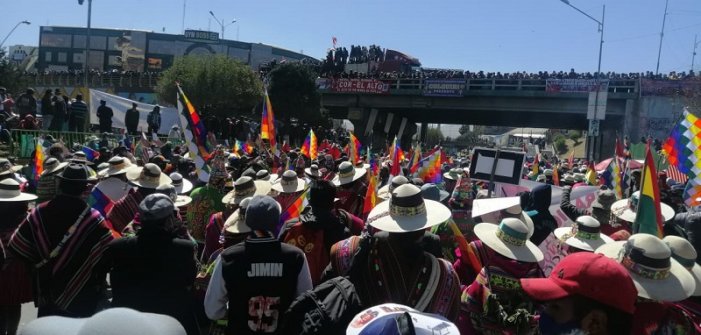On July 28, a massive march was held by the Central Obrera Boliviana (COB) along with various worker, peasant, and indigenous organizations to demand that the Supreme Electoral Tribunal (TSE) of Bolivia reinstate the general elections for September 6. On July 23, the TSE announced that it would postpone the elections for the fourth time this year, consolidating the coup government’s hold on power under the pretext of taking extreme measures to combat the spread of Covid-19 in the country.
In La Paz, the march started in Senkata and reached Ceja de El Alto. A massive assembly took place, led by various groups such as the Túpac Katari Federation, the ayllus (indigenous community organizations) of Norte Potosí, groups of factory workers and miners, the Bartolina Sisa organization of peasant women, and neighborhood councils. Similar mobilizations were carried out in other regions across the country to demand elections to continue on schedule.
In the El Alto assembly, COB leader Juan Carlos Huarachi took the floor to call on the TSE to overturn the resolution that postponed the election until October 18 within 72 hours. He announced an indefinite general strike with mobilizations and blockades in many departments until the postponement of the elections is reversed.
The massive mobilization showed that the peasant, popular, and workers’ sectors believe that the deep socio-health crisis in the country can be solved through fair elections. The candidate of the Movement to Socialism (MAS), Luis Arce Catacora, has the electoral support of these sectors, largely in response to the racist coup leaders that currently control the government.
Meanwhile, in the midst of the pandemic, self-proclaimed President Jeanine Áñez and her ministers have made it very clear that they have taken the power of the state solely for profit and put it at the service of their own class interests. One hundred days after imposing a militarized quarantine, the government continues to systematically refuse to implement mass testing. For weeks now, we have seen daily reports of dozens of deaths, with bodies being collected in the streets. The people of Bolivia are mourning their loved ones while living in fear of their own government’s inhumane policies.
Not only have the hospitals collapsed with significant casualties among the health workers, but the cemeteries and crematoriums have been overwhelmed. Access to medicine is a luxury and Bolivia is in short supply. The coup plotters spent most of their time making deals to purchase respirators at exorbitantly high prices, which were later proven to be useless to fight COVID-19 because they were in fact resuscitators. Since their own government is risking the lives of the poorest residents, many working class Bolivians are facing the worst of the outbreak.
This week, the interim government threatened a return to the rigid and militarized quarantine imposed earlier this year. The quarantine has the double purpose of “stopping” the geometric growth of COVID-19, while also attempting to contain the embryonic manifestations of class struggle that are taking form with actions such as assemblies and Tuesday’s announcement of a general strike. Unfortunately, so far this resistance and class struggle attaches all of its power to a hope that a government elected at the ballot box could be a way out of this oppressive regime.
While many oppressed sectors are pinning their hopes on voting for a MAS President, the MAS party line has continued to carry out a strategy of parliamentary negotiation with the coup government, despite its two-thirds majority in the Plurinational Legislative Assembly. MAS Senator Eva Copa, the president of the Senate, last Sunday stated that the MAS in Parliament will not hinder the new date of October 18.
The MAS strategy to negotiate in better conditions with the coup leaders shows, once again, that the MAS does not seek to defeat them in the streets but at the ballot box. This strategy was seen in Tuesday’s mobilization, which was held by the bureaucratic leadership in Ceja de El Alto. They launched the indefinite general strike with roadblocks in a bureaucratic way. For decades, they have refused to promote assemblies with grassroots delegates, the only true way to liberate the energies of the workers and the people in order to defeat the coup plotters. But the MAS bureaucracy is afraid of workers’ democracy; they know that they are hated and repudiated by broad sectors of the workers. This strategy that the MAS maintains, through bureaucracies of the social organizations and unions, is leading the coup leaders to continue supporting themselves while the positions of the MAS itself are weakened.
We defend the democratic rights of workers in the countryside and the city. Working class sectors, peasants, and indigenous people deserve to have elections. However, we call for the direction of that energy towards defeating the coup leaders who are making a deadly pandemic worse for millions of working and poor people. To that end, we must demand the immediate nationalization, without compensation, of the private clinics and the centralization of the health system under the democratic control of the workers. Healthcare resources must be used to save lives and not save the businesses of the private sector. We must democratize this fundamental right. People’s lives are at stake.
To make this urgent demand viable, it is necessary to form the broadest coordination of sectors of health workers, cleaning workers, workers, peasants, indigenous peoples, women, students, and neighborhood councils to impose a way out in the struggle so that the tremendous capitalist and health crisis that we have on our backs is not paid for by the working people, but by the rich and the capitalists.
Originally published in La Izquierda Diario.
Translated by Kimberly Ann.










